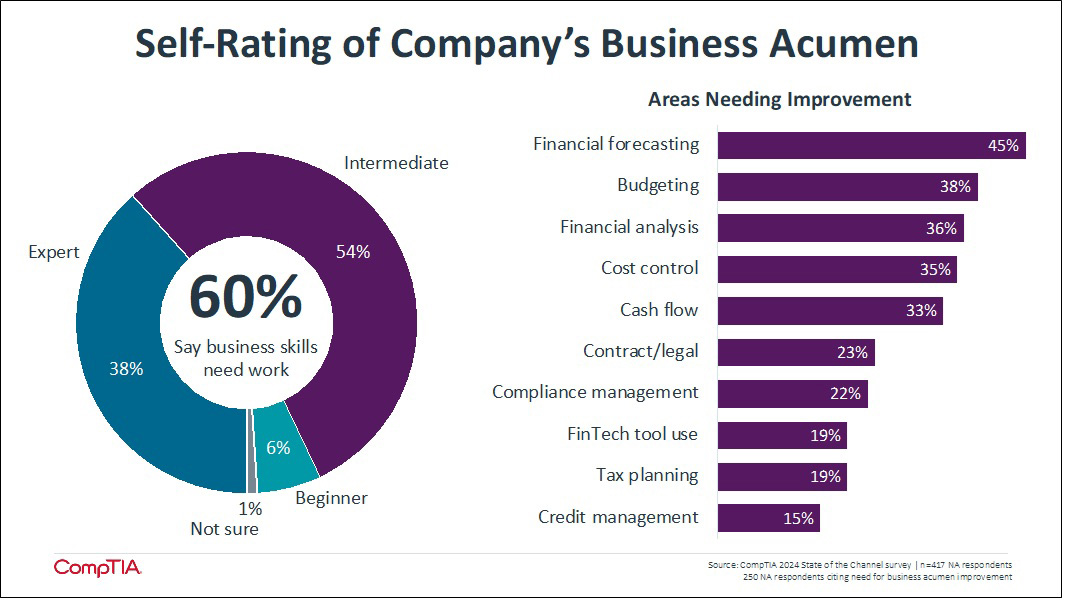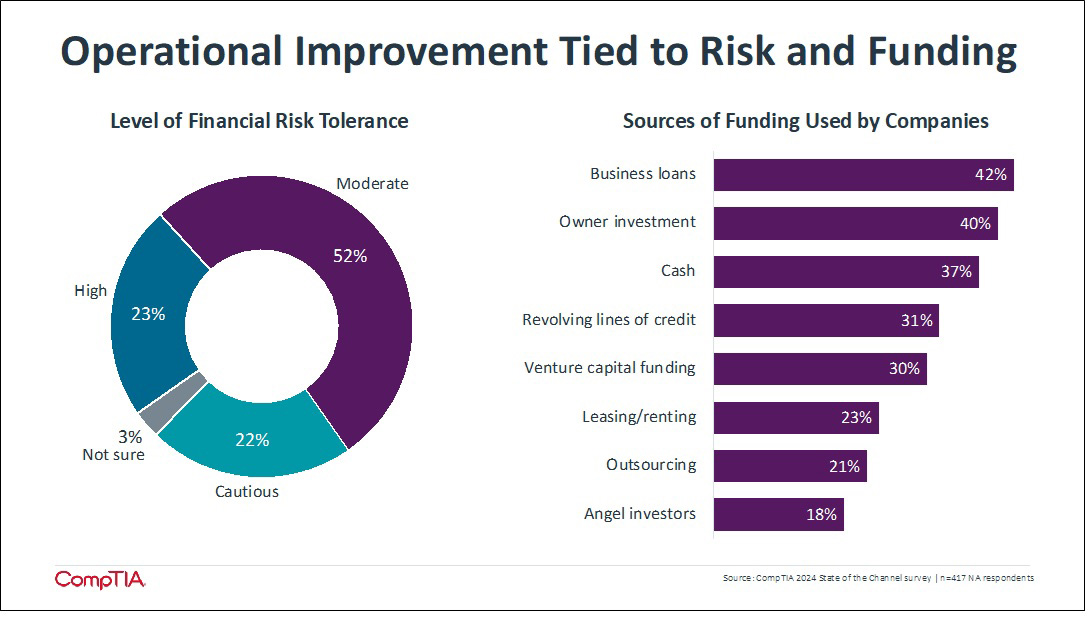 I recently spoke with Bob Coppedge, an MSP owner, CompTIA member and all-around good guy, who joined the CompTIA Volley podcast that I co-host (his episode aired March 29). On this episode, we talked about one of those reality check topics for many in the channel. The premise was simple: Are you running your business effectively at the most basic levels?
I recently spoke with Bob Coppedge, an MSP owner, CompTIA member and all-around good guy, who joined the CompTIA Volley podcast that I co-host (his episode aired March 29). On this episode, we talked about one of those reality check topics for many in the channel. The premise was simple: Are you running your business effectively at the most basic levels?
Seems like an obvious question, perhaps even slightly condescending to some, but alas it’s fair game when you look at the topic more deeply. As Coppedge, CEO of Ohio-based Simplex IT, explained, companies for a variety of reasons both practical and psychological tend to double down on the things they do well and enjoy most. The sexy stuff. But that can often mean turning a blind eye to other areas that need improvement, including far-less-exciting Business 101 fundamentals.
Related: Listen to CompTIA Volley podcast episodes and subscribe
Business basics matter a lot, however, yet they aren’t what channel executives typically talk about. Instead, discussions gravitate toward the latest and greatest technology skills and trends, customer wins, sales acumen and the good, bad, and ugly of their marketing approach. Tasks such as budgeting, financial forecasting, tax planning and HR policies get short shrift. But while these facets might seem table stakes, for many entrepreneurs in the channel these functions don’t come innately; they must be learned on the job or outsourced. And lack of attention to them can result in a shaky foundation for the business’ loftier aspirations.
All this musing stems from a section from the CompTIA State of Channel 2024 research report that explored the current level of business acumen and skills among channel firms. The aim was to get a sense of where channel firms feel they rate on the performance scale with some of the more bedrock functions of their company and where/how they can improve.
 Just more than half of respondents (54%) rate their level of overall business acumen as “intermediate.” This covers a range of general business skills and activities including budgeting, forecasting, accounting, tax planning, financial analysis, ROI analysis, risk assessment, among others. That assessment is mostly consistent across firm sizes except for the largest channel firms (500+ employees) that are far more likely to rate their skills in the “expert” category. That demarcation is unsurprising given that these largest channel entities are comprised of the big-name system integrators and IT services firms that mainly serve enterprise customers and are in some cases publicly traded companies themselves. Given that the vast majority (more than 75%) of channel firms are on the small side of the SMB category, the intermediate and/or beginner category related to business skills is the most common.
Just more than half of respondents (54%) rate their level of overall business acumen as “intermediate.” This covers a range of general business skills and activities including budgeting, forecasting, accounting, tax planning, financial analysis, ROI analysis, risk assessment, among others. That assessment is mostly consistent across firm sizes except for the largest channel firms (500+ employees) that are far more likely to rate their skills in the “expert” category. That demarcation is unsurprising given that these largest channel entities are comprised of the big-name system integrators and IT services firms that mainly serve enterprise customers and are in some cases publicly traded companies themselves. Given that the vast majority (more than 75%) of channel firms are on the small side of the SMB category, the intermediate and/or beginner category related to business skills is the most common.
In total, roughly 4 in 10 firms rate themselves “expert” at business-related skills – again mostly the largest firms – while just 6% put themselves in the ranks of “beginner.” Beginner status is more common for micro-sized companies of fewer than 10 employees, with 20% selecting that designation to describe their current level of skill. Groups in both the intermediate and beginner buckets said they have improvements to make across a range of different tactical and strategic elements of running a business, with beginners obviously citing the most work ahead of them. Experts say their business acumen is where they would like it to be today, but of course such measurements across skills are fluid and variable.
Even among the expert group, there are always areas that need improvement toward attaining better business fluency. No. 1 is financial forecasting, which 45% of respondents cited. Forecasting of any type is difficult, but in the last few years precise prognostication about future sales, profitability, customer demand, etc. has been further complicated by the pandemic’s impact on the economy. Familiar cadences and patterns for such things as average sales cycles, recurring monthly revenue, contract renewals, pricing of supplier goods, went out the window for many channel firms during this period. This coming year could signal a return to more predictability, but getting back to a more comfortable status is a top goal.
Other areas needing improvement are more balanced in terms of ranking: Budgeting (38% of respondents), financial analysis (36%), cost control, operational efficiency (35%) and cash flow management (33%) comprise the middle of the list, each representing a related aspect of better money stewardship. At the bottom of the list of improvements needed are functions that can, theoretically, be outsourced to experts such as compliance and regulatory issue management (22%) and tax planning (19%).
The first step to any issue is recognizing the need for help, but then, where do you find it? Channel firms looking to shore up or polish existing business operations have a variety of options at their disposal. For 46% of respondents to the study, the main place they’ve turned for help have been industry associations that offer business-related training and/or certifications. Among medium- and large-sized channel firms, the number availing themselves of industry associations climbs to 55% and 53%, respectively.
Other sources of training, consulting or advice include partner-to-partner networks (39%), vendor-based business training (37%) and third-party business consultants (32%). Looking to third parties for business fluency help, particularly vendors, has been on the wish list for the channel for years. Consider CompTIA research, Partner Experience Trends 2022, in which 40% and 35% of channel firms, respectively, cited operational business training and professional marketing training as benefits they would like their vendor partners to prioritize.
Improving the ways a business operates goes hand in hand with another facet of running a company: The willingness to take risks to grow or expand or improve operational performance. In this case, risks related to financing and using credit or other sources of capital to invest in the company’s growth or stability.
Historically, the smallest companies in the channel have tilted toward the conservative side when it comes to borrowing on credit or taking financial risks in general, whether that’s to enter a new market, fund a cap-ex purchase or finance any other major investment. For companies that are content to stay in their lane with minimal growth aspirations, risk aversion isn’t necessarily a negative. But in today’s more dynamic environment where there’s no longer one or two channel business models in play and the complexity of technology/business solutions is only increasing more quickly, competition to stand out is steep. That often compels making some bets on new investments and directions.
One factor driving greater examination of risk tolerance today is merger and acquisition goals. There are a few good reasons for that. One, many channel owners today are actively planning exit strategies, either for an imminent sale or, more often, in the foreseeable-but-still-years-off future. Savvy owners realize that their ideal sales outcome will be predicated on steps taken in the present day to bolster market value and attractiveness for a later time. That means growing company revenue, building an enterprise that is profitable and operationally efficient, competitively differentiating via new market entrance, tech innovations or specialization.
To achieve those things, business acumen is essential. This extends beyond retirement-minded channel firms, but to others involved in the busy M&A activity in the channel of the last couple years that is tied more to growth and expansion strategy than exiting the industry.
I asked Coppedge about risk tolerance/aversion and the channel’s conservative approach. He was decidedly realist in saying that most businesses are risk averse. No one wants to lose or put themselves in a precarious position. But, he said, if a company can confidently say in advance that they have a plan and the means to recover from a venture that doesn’t work out, then the opportunity should be explored.
But no recovery plan is possible without a solid business foundation in the first place. So, sexy or not, business fluency at the most basic level is not to be ignored.
Carolyn April is vice president of industry research at CompTIA.
2024 State of the Channel Research
Access the report now.


 Add CompTIA to your favorite RSS reader
Add CompTIA to your favorite RSS reader

